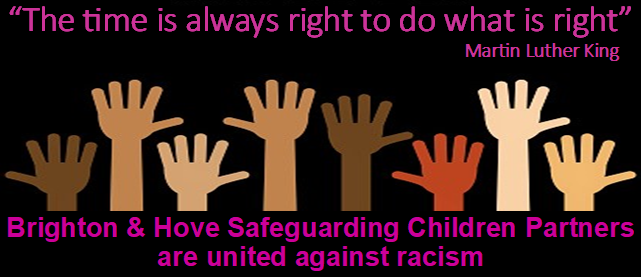Our Anti-Racist Practice Statement

Brighton & Hove Safeguarding Children’s Partnership Anti Racist Practice Statement
Guiding Principles
There is no place for racism in Brighton & Hove. We recognise that the impact racism has on our communities is devastating. It is our responsibility to create safe, inclusive and supporting environments and challenge racism when we see it. We stand firmly together with our partners in being committed to tackling institutional and interpersonal racism in all of its forms. We commit to listening, monitoring and continually evaluating our practice because we recognise that good anti-racist practice for the Partnership leads to better outcomes for our children in our city.
Anti-racist practice seeks to identify where people are discriminated against because of race or membership of global majority communities, and to take active steps to address the systems, privileges and everyday practices that maintain this unequal treatment, whether they be intentional or unintentional.
This statement seeks to set out the principles and actions we will adopt towards this aim. Anti-racist practice extends to how we work together as colleagues and professionals, as well as with families, children and young people.
We should speak up when professionals interact or behave in a way that is disrespectful or unacceptable, whether of families or of colleagues.
Anti-Racist working as a Safeguarding Children’s Partnership
- Accept racism exists and affects many of us and our children.
- Be aware of prejudices within ourselves, in others and in the services we provide.
- Be aware of the potential for stereotyping and bias. Do not make assumptions about someone’s race, ethnicity and culture, based on presenting behaviour or what is recorded about them within assessments or reports.
- Always consider the race, ethnicity and cultural needs of children, families and adults within our services and partnership activity.
- To strive as a partnership to deepen our understanding of both the structures of racism and the development of cultural competence and cultural humility.
- Be aware that families from black and global majority communities will have lived experience of racism, which may impact on how they present. The cumulative impact of racism is trauma and can impact on people’s mental health, in terms of anxiety and depression.
- Intersectionality: the different aspects of identity and their social implications can multiply inequalities and may further compound experiences of racism, discrimination, and oppression, in terms of being Black, male or female, unemployed, working class, poor health (including mental health), disabled, LGBTQ+ etc – particularly in terms of institutional and structural racism.
- Research reveals there is an overrepresentation of black children in our care system, child protection systems, within school exclusions and within mental health and criminal justice services. We need to consider the cause, not just behaviours and plan appropriate support and challenge to services within the community.
- Wherever possible, ensure that black African, Caribbean/Asian/Muslim fathers (and those from other minoritised communities) are included in assessments, decision making and as potential carers in their children’s lives – even if they are ‘non-resident’ (as they are not always absent).
- Consider the Adultification of black children, whereby black boys and girls can be treated more like adults due to perceptions of them presenting as older or more confident than their white peers. Remember they are children first and foremost.
Recognising & Challenging Racism
- The Partnership needs to promote that a key part of anti-racist practice is ensuring you look at your beliefs and where they come from and to educate yourself about different cultural practices/traditions, customs and norms that may be unfamiliar to you e.g. female genital mutilation, honour based abuse, forced marriage, Child abuse linked to faith or belief, breast flattening. Be aware that these issues can impact on white communities too.
- Consider diverse communities’ religion and cultural festivals, such as Ramadan, Eid, Chinese New Year, Yom Kippur, Diwali. Be mindful of families who may be fasting for Ramadan for instance, when arranging appointments.
- Don’t just consider ‘cultural competence’, which relates to reading/researching about someone’s culture from a white privileged perspective, consider ‘cultural humility’ too, which focusses on continued learning about black communities, beliefs, norms, customs, faith, and traditions. This requires reflection on one’s own beliefs, values and biases and how this may impact on how we receive information and respect the culture and values of others, it encourages us to remain curious and be mindful of White Privilege.
- It is important to be responsible for calling out and challenging racism when we come across it. Whether amongst colleagues, employees, or families with whom we work with.
- Microaggressions are statements that put white people into a dominant position without being obviously hostile and are a ‘subtle’ form of racism, which people can use intentionally or unintentionally. These are to be avoided.
- Being an ally to all in the partnership and the families with whom we work involves noticing microaggressions, discrimination, assumptions, stereotypes, oppression and racism and feeling confident enough to challenge it, in all its forms, in a nonconfrontational manner, by asking questions and making people aware that what they are saying or doing is discriminatory, offensive, or racist and why.
- We need to be open to being challenged and to recognise in ourselves that this might be difficult and uncomfortable and be aware of possible defensiveness we may have about this.
